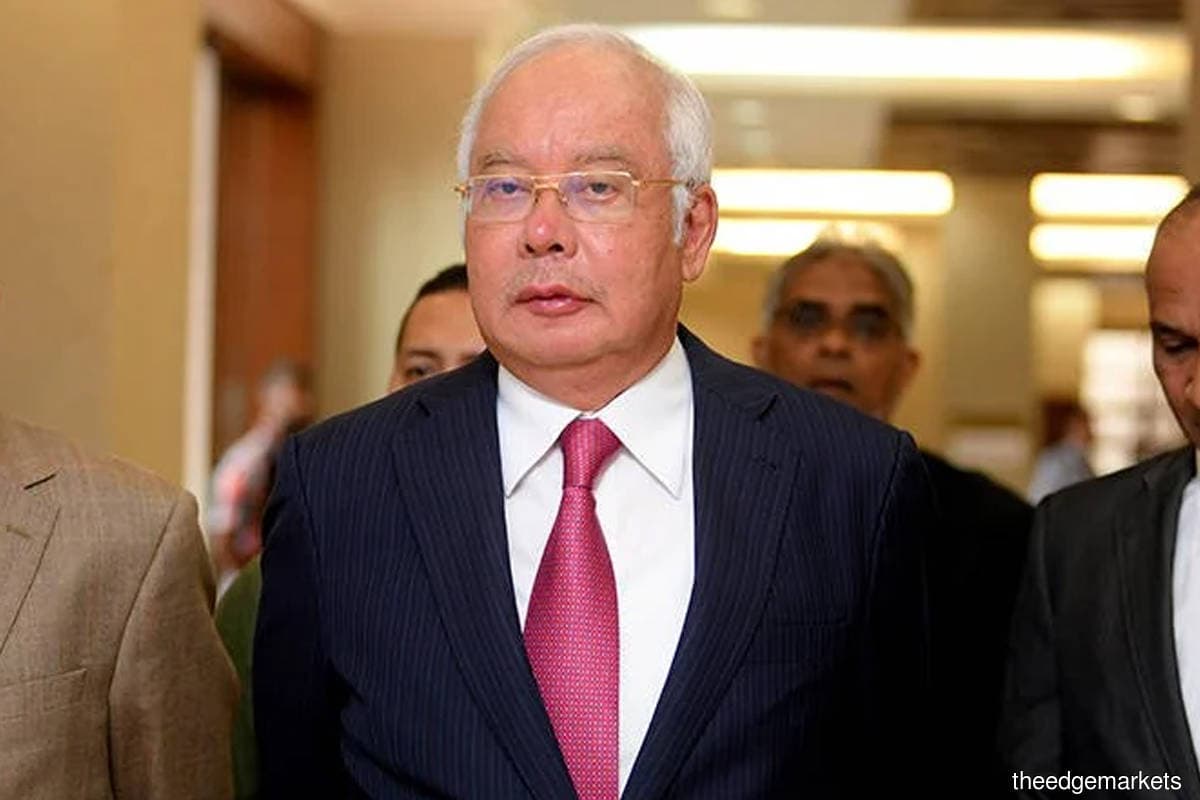
This article first appeared in The Edge Malaysia Weekly on April 26, 2021 - May 2, 2021
LAST week, the prosecution poured scorn on the defence’s arguments that Datuk Seri Najib Razak had no knowledge that money transferred to his bank accounts was from SRC International Sdn Bhd, dismissing the arguments as an “afterthought”.
In concluding its submissions at the Court of Appeal, the prosecution set out to dismantle the defence’s arguments that the former prime minister did not know that funds from SRC — a company he oversaw as shareholder of Minister of Finance Inc — were transferred into his personal bank accounts between 2011 and 2014. Lead prosecutor Datuk V Sithambaram observed that it was ludicrous of Najib to claim he was a victim of a conspiracy when he actually benefited from the transfers.
Sithambaram asserted that it was ridiculous of the defence to paint businessman, and now fugitive, Low Taek Jho (better known as Jho Low) as a puppeteer who had “used” Najib for his own benefit when the fact remains that at least RM42 million of SRC funds had gone into the latter’s personal accounts at Ambank.
“Evidence of Najib’s involvement is apparent from the roles played by his close associates. Evidently, Najib did benefit from the transactions effected by Jho Low, but as an afterthought blames Jho Low for the offences committed by him,” said Sithambaram. In fact, Low was not even authorised to access the former premier’s accounts at AmBank as the mandate holder was former SRC managing director and CEO Nik Faisal Ariff Kamil, whom Najib retained in the position for years after he was sacked and until the accounts were eventually closed.
In this sense, Sithambaram described Nik Faisal as being Najib’s lieutenant in carrying out his orders to the board of directors at SRC. Being the mandate holder of the then prime minister’s personal accounts is the best evidence of the trusting relationship between the two, he argued.
“Any attempt by the appellant to disassociate himself from Nik Faisal’s actions when the appellant’s directions to the SRC board of directors were given via Nik Faisal is not credible. Similarly, to suggest that Nik Faisal went rogue in relation to the letter of instructions to the bank is simply outrageous,” said Sithambaram.
On the defence’s claims that Najib had no inkling of the balance or state of his accounts as he was not the one managing them, and that he only had a “sense” of the balance when using the funds, Sithambaram observed, “Najib, who was the PM/FM then, could have issued a cheque for a large sum of RM2.5 million simply based on a ‘sense’ that there was sufficient funds in his account and risk the cheque being dishonoured. Does anyone issue cheques without knowing the balance, but merely by having a ‘sense’ that there were funds in the accounts?
Sitham indicated his surprise that the cheques Najib issued, even when the amount was outrageous, had never bounced, likely because the trio of Jho Low, Nik Faisal and Najib’s then principal private secretary, the late Datuk Azlin Alias, were tasked to ensure there were sufficient funds in those accounts.
“The learned judge rightly pointed out that the continuous issuing of cheques by the appellant which pushes his accounts into the red clearly show that the appellant was confident that his cheques would not be dishonoured as the trio would ensure the cheques would be cleared.,” Sithambaram said of High Court judge Mohd Nazlan Ghazali’s judgment.
He submitted from the many cheques issued and their values, Najib knew that the RM42 million in his bank accounts was from SRC. And he had also allowed Jho Low to take whatever steps necessary to ensure there were available funds to clear his cheques.
The former premier also claimed during his testimony that his signatures were forged in several documents related to SRC. Among the documents in question were six different shareholders’ minutes of SRC and a letter dated Dec 24, 2014, relating to transfer instructions by SRC, all of which were signed by Najib.
Sithambaram pointed out that the dispute over the authenticity of Najib’s signatures was only brought up to rebut the finding of the court at the close of the prosecution’s case that Najib was in fact the agent and shadow director of SRC based on the seven disputed documents.
If the documents had indeed been forged, Najib could have brought attention to the matter when he was called in for investigations by the Malaysian Anti-Corruption Commission (MACC), but the signatures were instead confirmed to the investigating officer, said Sithambaram. Hence, he asserted, Najib’s claim that the documents were a forgery was mere fabrication and “an afterthought unsupported by any evidence or any expert witness”.
During the trial at the High Court, Najib had in fact made an application to call in an expert to examine the signatures to determine their authenticity. Ultimately, the defence decided not to call Australian expert Dr Steven Strach to present his report even though he had conducted a detailed forensic examination of the documents. The defence said an “impasse has arisen relating to the terms of Dr Strach’s appointment”. Sithambaram argued a suitable replacement should have been identified, considering that Najib was initially adamant about wanting an expert to examine the documents before he would acknowledge any of his own signatures.
“It must be remembered that the forthcoming document examiner’s report was the basis for the refusal by the appellant to confirm the authenticity of the documents. The appellant withheld his answers on the documents until their authenticity was confirmed by the expert.
“The learned judge was right to find that the appellant’s entire evidence on his signature is nothing but a convenient afterthought from the totality of the evidence adduced.”
Save by subscribing to us for your print and/or digital copy.
P/S: The Edge is also available on Apple's AppStore and Androids' Google Play.